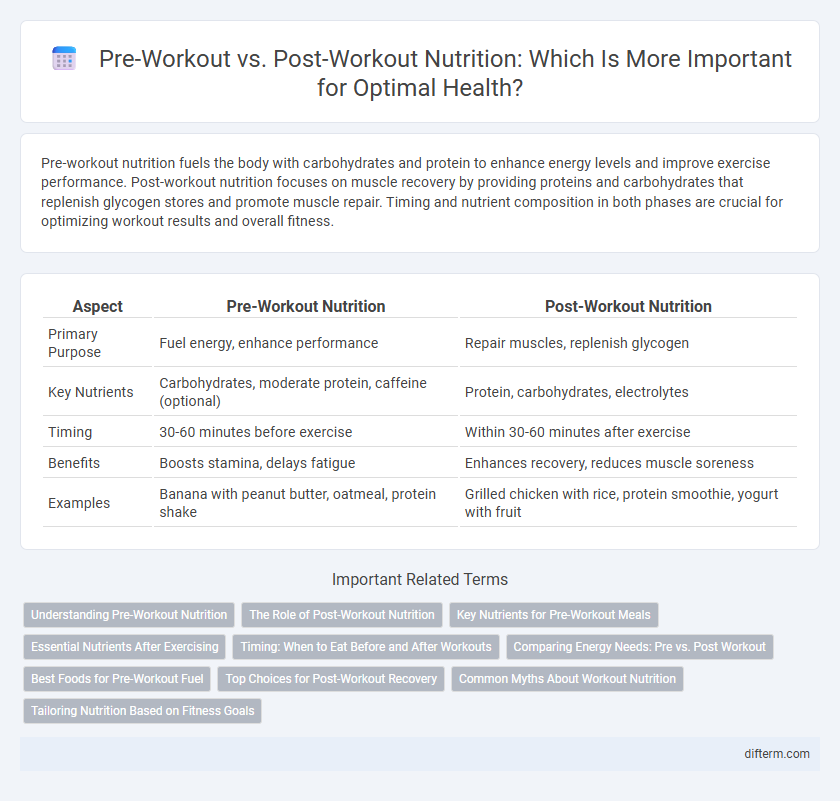Pre-workout nutrition fuels the body with carbohydrates and protein to enhance energy levels and improve exercise performance. Post-workout nutrition focuses on muscle recovery by providing proteins and carbohydrates that replenish glycogen stores and promote muscle repair. Timing and nutrient composition in both phases are crucial for optimizing workout results and overall fitness.
Table of Comparison
| Aspect | Pre-Workout Nutrition | Post-Workout Nutrition |
|---|---|---|
| Primary Purpose | Fuel energy, enhance performance | Repair muscles, replenish glycogen |
| Key Nutrients | Carbohydrates, moderate protein, caffeine (optional) | Protein, carbohydrates, electrolytes |
| Timing | 30-60 minutes before exercise | Within 30-60 minutes after exercise |
| Benefits | Boosts stamina, delays fatigue | Enhances recovery, reduces muscle soreness |
| Examples | Banana with peanut butter, oatmeal, protein shake | Grilled chicken with rice, protein smoothie, yogurt with fruit |
Understanding Pre-Workout Nutrition
Pre-workout nutrition centers on consuming easily digestible carbohydrates and moderate protein 30 to 60 minutes before exercise to fuel muscles and enhance endurance. Nutrients like glucose provide essential energy, while amino acids from protein support muscle repair and reduce exercise-induced breakdown. Proper hydration alongside a balanced pre-workout meal optimizes performance and delays fatigue during training.
The Role of Post-Workout Nutrition
Post-workout nutrition plays a crucial role in muscle recovery, glycogen replenishment, and protein synthesis stimulation, which are vital for optimizing strength and endurance gains. Consuming a balanced mix of carbohydrates and high-quality protein within 30 to 60 minutes after exercise accelerates muscle repair and reduces muscle soreness. Timing and nutrient composition post-exercise significantly influence overall athletic performance and recovery efficiency.
Key Nutrients for Pre-Workout Meals
Key nutrients for pre-workout meals include complex carbohydrates, lean proteins, and healthy fats to provide sustained energy and support muscle function during exercise. Consuming easily digestible carbs such as oats or sweet potatoes helps maintain blood glucose levels, while proteins like chicken or Greek yogurt aid in muscle repair and preparation. Hydration and micronutrients like electrolytes also play a crucial role in optimizing performance and preventing fatigue.
Essential Nutrients After Exercising
Post-workout nutrition prioritizes replenishing glycogen stores with carbohydrates and promoting muscle repair through high-quality proteins rich in essential amino acids like leucine. Consuming antioxidants such as vitamins C and E helps reduce exercise-induced oxidative stress, while minerals like potassium and magnesium aid in electrolyte balance and muscle function recovery. Optimal nutrient timing post-exercise also enhances insulin sensitivity, supporting efficient nutrient uptake and accelerated recovery processes.
Timing: When to Eat Before and After Workouts
Consuming easily digestible carbohydrates and moderate protein 30 to 60 minutes before exercise enhances energy levels and muscle performance. Post-workout nutrition, ideally within 30 minutes to 2 hours, should emphasize protein intake for muscle repair and carbohydrates to replenish glycogen stores. Proper timing of nutrient intake optimizes recovery, reduces muscle soreness, and supports overall workout effectiveness.
Comparing Energy Needs: Pre vs. Post Workout
Pre-workout nutrition primarily focuses on fueling the body with carbohydrates and moderate protein to maximize energy availability and stamina during exercise. Post-workout nutrition centers on replenishing glycogen stores through carbohydrates and repairing muscle tissue with higher protein intake. Comparing energy needs, pre-workout meals require easily digestible sources to prevent fatigue, while post-workout meals demand nutrient-dense recovery foods to optimize muscle repair and restore energy balance.
Best Foods for Pre-Workout Fuel
Optimal pre-workout nutrition includes easily digestible carbohydrates such as bananas, oats, and whole grain toast to provide quick energy and sustain endurance during exercise. Incorporating moderate amounts of protein from sources like Greek yogurt, eggs, or whey protein supports muscle repair and enhances performance. Hydration with water or electrolyte-rich drinks improves stamina and prevents dehydration, making these foods essential for effective pre-workout fueling.
Top Choices for Post-Workout Recovery
Optimal post-workout nutrition centers on replenishing glycogen stores and repairing muscle tissue through high-quality protein sources like whey, lean chicken, or plant-based alternatives combined with complex carbohydrates such as sweet potatoes, quinoa, or brown rice. Hydration with electrolyte-rich fluids and incorporating antioxidants from fruits like berries and oranges accelerates recovery by reducing inflammation and oxidative stress. Timing intake within 30 to 60 minutes post-exercise maximizes nutrient absorption and supports efficient muscle recovery and growth.
Common Myths About Workout Nutrition
Common myths about workout nutrition often claim that pre-workout meals alone determine performance, while post-workout nutrition solely affects recovery, but both phases contribute significantly to overall fitness results. Many believe that skipping post-workout protein impairs muscle growth, yet total daily protein intake plays a more crucial role than timing. Misconceptions regarding carbohydrate consumption before or after exercise overlook its importance in fueling workouts and replenishing glycogen stores efficiently.
Tailoring Nutrition Based on Fitness Goals
Pre-workout nutrition emphasizes carbohydrates and moderate protein to fuel performance and enhance endurance during exercise, while post-workout nutrition prioritizes protein and fast-digesting carbs to maximize muscle recovery and glycogen replenishment. For muscle gain, a higher intake of protein and calories post-exercise supports hypertrophy, whereas endurance athletes benefit from balanced pre- and post-workout meals rich in complex carbohydrates to sustain energy levels. Tailoring nutrient timing and macronutrient ratios based on individual fitness goals optimizes workout effectiveness and accelerates progress.
Pre-Workout vs Post-Workout Nutrition Infographic

 difterm.com
difterm.com